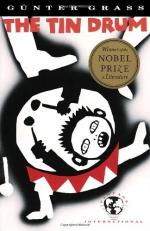|
|
The Tin Drum Chapter 14: Herbert Truczinski's Back
After his mother's death, Oskar lost all his will; he stopped breaking up demonstrations with his drum and singing out the glass of shop windows. Oskar plunged himself into Gretchen Scheffler's books, and spent time taking walks alone. On one of these walks, Oskar ran into Bebra, who invited him to a cup of coffee at the Four Seasons hotel. With Bebra was a beautiful woman who, like Oskar and Bebra, had chosen not to grow: her name was Roswitha Raguna. Bebra asked about Oskar's dejection; he told of his mother's death. Roswitha immediately invites Oskar to travel around Europe with her and Bebra. In the same breath, however, as she gazed into Oskar, she trembled and withdrew from him. Oskar asked Bebra to explain why she shied away. He said:
"'Your genius, my young friend, the divine, but also no doubt the diabolical elements in your genius have rather confused my good Roswitha, and I too must own that you have in you a certain immoderation, a certain explosiveness, which to me is alien though not quite incomprehensible.'" Chapter 14, pg. 172
Oskar refused their offer to travel, which relieved Roswitha. Oskar asked for an empty water glass, and when it came he sang a heart-shaped hole in its side. He engraved an inscription underneath the hole with his voice: it said "Oskar for Roswitha". She took it happily. Outside, Oskar told Bebra of his drumming career under rostrums - Bebra whispered that he had failed as a teacher; politics are so filthy.
Oskar found himself with no one - Alfred was consumed with grief, Jan stopped visiting, and Anna at times blamed Oskar and his drumming for his mother's death. Oskar was reduced to stomping up and down the four flights of stairs of the apartment building with his drum. Sometimes he would play duets with Meyn the Trumpeter, who was always dead-drunk in the attic, until Meyn joined the Mounted SA and went sober. The children of the apartment had grown up and didn't make brick soup anymore; Oskar hardly knew them. When he needed company, he would go to the second floor and knock on the door of Mother Truczinski, who always let him in. She had four children, Herbert, Maria, Guste, and Fritz Truczinski.
Herbert became one of Oskar's great friends. Herbert worked in a bar for sailors on the waterfront, frequented mostly by Scandinavians. Once or twice a month, Herbert came home in an ambulance, having been stabbed in the back by a sailor after a fight. Once his back healed, Oskar would be allowed to inspect the scars on Herbert's massive back. In the institution, Oskar compares those scars to the "secret parts" of a few women he has known - "hard, sensitive, and disconcerting."
Oskar says he finds a suggestion of his own umbilical cord in the scars on Herbert Truczinski's back:
"You've guessed it no doubt: Oskar's aim is to get back to the umbilical cord; that is the sole purpose behind this whole vast verbal effort and my only reason for dwelling on Herbert Truczinski's scars." Chapter 14, pg. 179
As Oskar pushed on each scar with his finger or drumstick, Herbert would tell him the story that went along with it - all were battles that took place over Herbert's pride. A few weeks later, Herbert would not have his scars pushed anymore - he had killed a Latvian sea captain in self-defense and could not get over his guilt. He gave notice at the bar and quit, although his boss tried in vain to persuade him otherwise.




